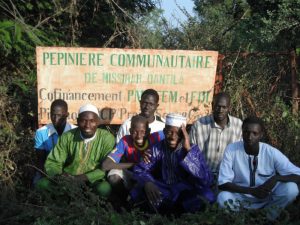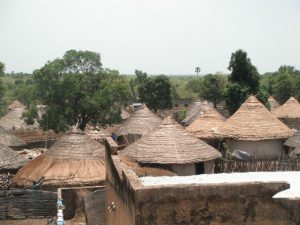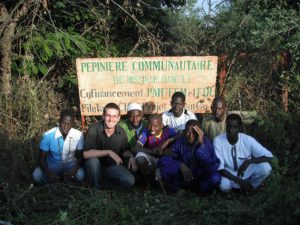 Location
Location
Missirah Dantila, Saraya District, Kedougou Region, Senegal
Community Description
Missirah Dantila is a village of almost 1,000 people in the far southeast corner of Senegal. In Malinke, the local language, many people say about Missirah, “a be wulobaa kono!” (that’s the way in the bush!). At more than 100 kilometers from the regional capital, Missirah is indeed remote.
Clean water is scarce, and many people get their drinking water straight from the nearby river. Seasonal flooding and only once-a-week transportation to Kedougou makes access very difficult.
It is, however, a dynamic, energetic village. A health post and a motivated team of health workers cover the numerous surrounding villages. Also, numerous individuals have begun small enterprises, including a peanut butter-making business, a small bakery, and small gardening s.
 The people of Missirah are a wonderfully generous, warm, and perpetually joking bunch. Though elders are always treated with the utmost respect, conversations among peers and children are invariably full of jokes and silly insults. They are incredibly welcoming to outsiders, and deeply engaged in work and development projects.
The people of Missirah are a wonderfully generous, warm, and perpetually joking bunch. Though elders are always treated with the utmost respect, conversations among peers and children are invariably full of jokes and silly insults. They are incredibly welcoming to outsiders, and deeply engaged in work and development projects.
An attempt was made 2 years ago to start a tree nursery on a small wooded plot at the edge of the village. The effort was unsuccessful because the nearby well was broken and dry. A somewhat dilapidated metal fence is already in place and a ‘Pepiniere Communautaire’ sign clearly marks the site.
Project Description
This project is to build a well to provide water for the community tree nursery.
The building of a new, reinforced well at the site will capitalize on existing resources (fencing, cleared plot, already trained individuals, existing partners in Kedougou) to enable the people of Missirah to establish a functional, sustainable nursery.
 Mangoes, citrus, guava, and numerous live fencing species will be grown and sold once the well is in place, thus enabling long-term economic growth.
Mangoes, citrus, guava, and numerous live fencing species will be grown and sold once the well is in place, thus enabling long-term economic growth.
The community group heading up the project is called Partners for a Greener Community. They are a group of 15 people, ranging in ages from 14 to 35, led by a dynamic entrepreneur named Alpha Tandian. They will provide the labor, prepare the site, fill and plant tree sacks, and water and weed throughout the season. They will be assisted throughout the project by between fifteen and twenty other community members not directly involved in the group.
The well will be dug, lined and cemented by another villager named Kubi Camera. He estimates that the work will take between one and two weeks.
Water Charity funds will pay for the labor and materials required to dig, line, and cement the well, and provide a raised exterior.
The community group will provide all extra labor and materials to prepare the site, buy rope and a pulley for the well, and begin tree planting work.
This project has been designed in collaboration with local partners. Yaajende, a USAID agriculture, and nutrition project have signed a contract with the Missirah community group to both provide seeds and buy all fruit and live fencing species produced in the nursery.
In addition, the Peace Corps and Trees for The Future will provide tree sacks, training, and extra seeds.
Project Impact
35 people will directly benefit from the project. The buyers of the fruit and live fencing species produced will indirectly benefit.
Peace Corps Volunteer Directing Project
Ian Hennessee
Comments
A functioning tree nursery will provide the great financial potential for the community organization and village at large.
The focus on live fencing species could enormously benefit the village and local environment by reducing the number of trees cut down and manpower hours spent in building dead-wood fences.
Dollar Amount of Project
$340.00
Donations Collected to Date
$340.00
Dollar Amount Needed
$0.00 – This project has been fully funded through the generosity of Simon de Winter, Victoria, Australia.
We encourage others to continue to donate using the Donate button below, and we will notify Peace Corps Volunteer Ian Hennessee of your donation. Additional funds will be used to fund the next project by Ian and/or those of other PCVs in the country of service.
![]() This project has been finished. To read about the conclusion of the project, CLICK HERE.
This project has been finished. To read about the conclusion of the project, CLICK HERE.